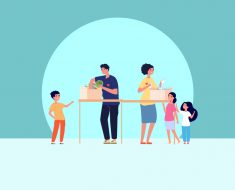I remember the moment I first said the words out loud. My mother was at the kitchen counter tending to a pot of coffee because I’d shown up on her doorstep in the morning. At 24, I had entered the house I once shared with her and my dad, still shaking from the adrenaline of having barely escaped from my own home earlier that morning. Foggy from having just woken up, she welcomed me inside and I sat at the table I’d eaten at so many times before. The moment my mother’s back was turned, I found the courage to share the dark secret I’d been keeping for months: I was in an abusive relationship.
While I wasn’t a teen when I dated my abuser, many adolescents are victims of domestic violence. According to the Centers For Disease Control and Prevention, almost one in 11 girls and nearly one in 14 boys of high school age report experiencing dating violence in the last year. While a 2019 survey by the Association of American Universities stated, “The prevalence rate of intimate partner violence was 10.1 percent among all students who had been in a partnered relationship since entering college. The range across schools was from 6 percent to 14 percent.”
This knowledge, paired with the heartbreaking truth of how some abusive relationships can end — with Gabby Petito the latest high-profile example — may prompt some parents to wonder how they help protect their children, no matter their age.
According to Dr. Anisha Patel-Dunn, a practicing psychiatrist and chief medical officer of LifeStance Health, victims of domestic violence often avoid confiding in family members. “They may feel embarrassed about opening up to their parents out of fear that they’ll be judged or blamed for the situation,” Patel-Dunn tells SheKnows. “While victims are never at fault, they may feel like they ‘caused’ the situation, which can contribute to confusion when it comes to confiding in a loved one or parent.”
“Pink flags don’t always seem unhealthy which makes them trickier to identify.”
Abuse often starts off slowly, presenting itself with “pink flags” — meaning, small incidents that hardly seem impactful on their own: An unkind word, hints of jealousy, the occasional angry outburst, typically followed by loving apologies. Parents don’t always bear witness to these events and like many others, I didn’t divulge my relationship problems to my parents, namely because I didn’t want to turn them against my partner.
More obvious signs of domestic violence can include your child spending an increasing amount of time with their partner while abandoning their personal interests, which can signify that they’re losing their individuality. Or, they might express concern about being separated from their partner or fearing missing their calls or texts (and becoming overly apologetic when they do). According to Patel-Dunn, this could mean your child is uncomfortable making decisions without their partner’s approval. For example, if your child always bends to the whims of their partner, it may indicate they’re trying to avoid conflict, as opposed to finding a compromise. “It’s subtle, and not something that signifies domestic violence in a silo, but along with other red flags can signal an inability or fear of making decisions that would upset a partner or trigger them in any way,” she explains.
Pink flags don’t always seem unhealthy which makes them trickier to identify. According to clinical psychologist Dr. Bethany Cook, an oft-overlooked warning sign is “a sudden onset of happiness, euphoria, and excitement stemming from a new relationship with someone else.” While those emotions can reflect a happy and healthy relationship, they can also be the result of a practice called “Love Bombing,” when abusers use an onslaught of positive words to manipulate their partner’s emotions in order to win their trust and loyalty, with the ultimate goal of exploitation.
“The good news is, parents can talk to their children about domestic violence even before it becomes a concern.”
As a parent, you may not witness “love bombing” in action, but the aftermath can trigger changes in your child’s moods or behavior. “When someone is being love-bombed they feel on top of the world and are often very happy and joyful,” Cook tells SheKnows. “However, the abuser may stop calling your child, ignore their texts, or become verbally abusive” triggering a rollercoaster of emotions.
Other signs of domestic violence: If your child is still living at home, you may notice their partner popping up unannounced and demanding they drop everything to be with them. “This person may also purposefully show up at family events to which they were not invited and refuse to leave unless your child goes with them,” Cook says. “This individual may also complain about your child’s friends in an effort to guilt him or her into spending less time with them.”
While Patel-Dunn says domestic violence signs can vary, “Anytime parents notice a sudden change in their child’s attitude or behavior, I recommend finding a safe place and time to talk.” If you are concerned, have a private conversation with your child. “But avoid communicating through phone or email, as abusers may monitor electronic communication,” she says.
If you’re unsure about how to begin, Cook advises asking general questions like, “Are you happy?” or “Does this person inspire you to be a better version of yourself?” before sharing specific changes you’ve noticed in your child’s behavior. “Ask if they’ve noticed the changes as well. Ask them if they like the changes.” However, try to remain calm and avoid accusations. “Give objective feedback. Maybe they haven’t noticed these behaviors,” she says.
Unfortunately, prohibiting your child from seeing their partner can backfire. “Unless you plan on locking your kid in their room and removing all contact with the outside world, it’s really hard to enforce that mandate,” explains Cook.
The good news is, parents can talk to their children about domestic violence even before it becomes a concern. That’s because kids pick up cues about what is, and isn’t, appropriate in relationships long before they’re ready to date. “Parents start to influence their child’s tolerance for abuse from the time they are old enough to refuse a kiss or a hug from Grandma,” says Cook. “It all starts with consent: Do you allow your child to have full autonomy of themselves from a young age? Do you educate them about consent? Do you teach them that it’s okay to say ‘No’ and that word is a complete sentence without explanation?”
One common way that parents unintentionally gaslight young children is by invalidating their feelings. According to Cook, statements like “Don’t cry, you just scraped your knee,” “Don’t be a baby,” or “You’re not afraid, you’ve had shots before — just relax” can condition kids to accept another person’s version of events.
Once children are tweens and become aware of romantic relationships, parents can directly address appropriate behavior when they witness real-world examples.
These conversations don’t have to be big sit-down moments either — they can occur organically. “Point out every time you see victim-blaming in the media and talk about how everyone is responsible for their own actions and reactions,” says Cook. And instill the idea that it’s everyone’s responsibility to control their own anger without getting violent. “An abuser’s behaviors reflect their inner world, not yours,” she says.
If you’ve discovered that your child has been the victim of domestic violence, you may feel as though you’re partially to blame because you didn’t see the signs, however, experts agree that this couldn’t be further from the truth. “I want to reiterate that domestic violence is never the victim’s fault or the victim’s family’s fault, and it can happen to anyone regardless of gender, socioeconomic status, race, ethnicity, or sexual orientation,” says Patel-Dunn. “It’s a common tactic for abusers to claim that the fault lies with the victim, but that is so they can continue the emotional abuse and shame their victims.”
“About one in four women and one in seven men will experience violence by an intimate partner in their lifetime,” Patel-Dunn continues. “While victims may feel isolated and alone, there are a number of resources and support available.” Here are a few suggestions.
That day in my parents’ kitchen, I began the process of leaving my abuser, which I couldn’t have done without their love and support. While no parent can outright prevent their child from experiencing an abusive relationship, recognizing the signs and knowing how to help can possibly save their life.
Read on for celebrity moms who battled postpartum depression.

Source: Read Full Article





